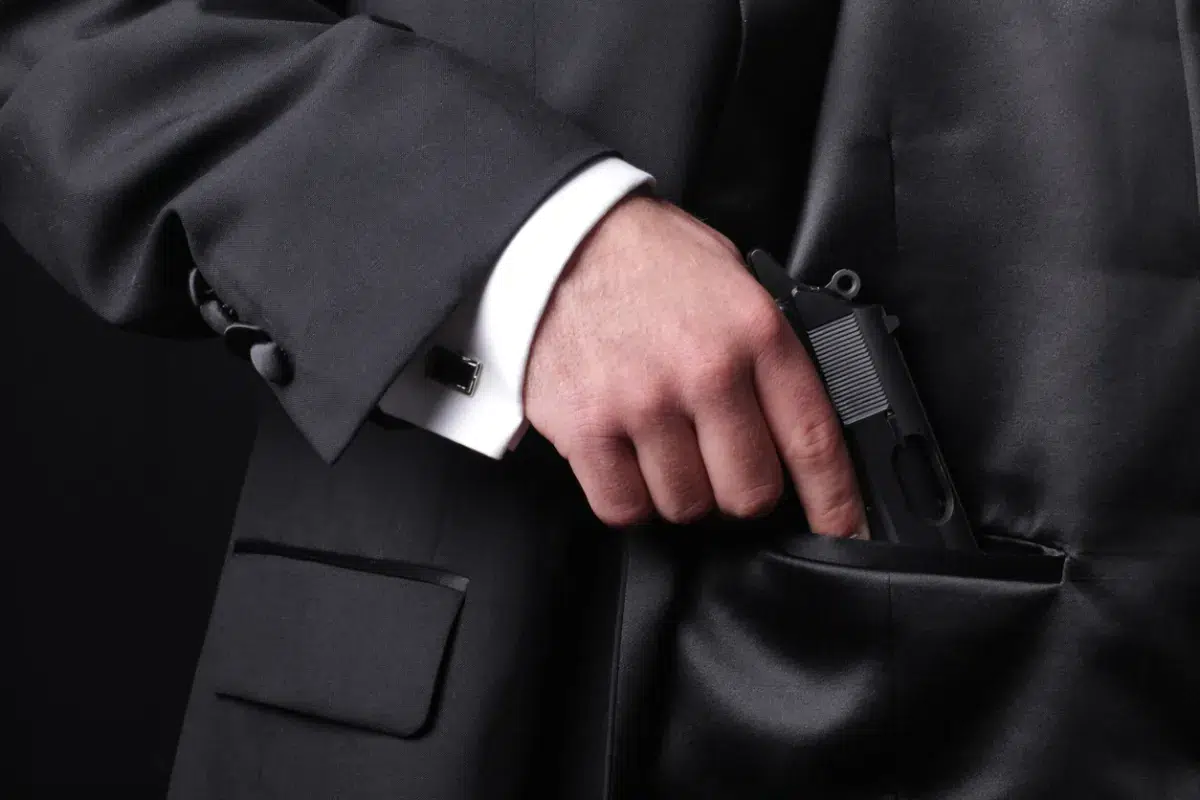The U.S. Constitution protects your right to keep and bear arms. However, this right is not absolute. For example, Virginia law regulates carrying a concealed weapon. The concealed handgun laws protect law enforcement officers and the public from people who might use such weapons to cause injury or death.
Violations of the commonwealth’s concealed weapons laws are typically punished as misdemeanor offenses. However, under some circumstances, prosecutors can pursue felony charges for carrying a concealed weapon under Virginia gun laws.
Felony convictions can result in imprisonment as well as a criminal record that blocks you from ever owning or possessing a firearm again. A criminal defense lawyer can work to reduce or eliminate your charges.
Understanding the Responsibility of Concealed Carry in Virginia
A concealed weapon is carried while “hidden from common observation.” This definition includes any weapon that is disguised so that observers cannot determine its true nature as a weapon. Virginia law prohibits carrying a concealed weapon unless you have a valid concealed handgun permit.
Anyone without a valid permit must carry weapons in plain view or in a manner specifically exempted by law. For example, a valid concealed handgun permit is not required for the following weapons, even if they are not in plain view:
- Weapons in a person’s own home and the land immediately around it
- A weapon in the person’s own place of business
- Weapons carried by a law enforcement officer engaged in official duties
- Unloaded and securely wrapped weapons carried by a regularly enrolled member of a target shooting organization to an established shooting range
- Unloaded and securely wrapped weapons carried by members of a weapons collecting organization to a bona fide weapons exhibition
- Weapons used for lawful hunting
- Firearms carried by retired law enforcement officers
- Firearms carried by people with an out-of-state concealed handgun permit with Virginia reciprocity
- Firearms carried by a Commonwealth attorney or assistant attorney
- Weapons carried in secured containers or compartments inside personal vehicles
Carrying a concealed weapon in any other way requires a valid permit. To obtain a concealed handgun permit, you must meet the Commonwealth’s eligibility criteria and submit an application. Specifically, you must meet the following criteria:
- At least 21 years old
- A Virginia resident
- Demonstrated competence with firearms
- Paid an application fee
- Passed a background check using the central criminal records exchange
You can prove that you are a competent person to handle firearms by presenting a certificate of completion from a firearms safety or firearms training course. You can also establish competency by showing that you are currently a member of the armed forces, received an honorable discharge from the armed forces, or are a retired law enforcement officer.
Additionally, certain people are not allowed to obtain a concealed handgun permit, including the following:
- Anyone prohibited from possessing a firearm under federal law
- Anyone acquitted of criminal charges by reason of insanity
- Anyone found legally incompetent or mentally incapacitated
- Anyone involuntarily committed or ordered to treatment
- People subject to a restraining order, a temporary protection order, or a substantial risk order
- People convicted of two or more misdemeanors within five years before the application
- Anyone addicted to a controlled substance
- People convicted of DUI or public drunkenness within three years before the application
- Any alien other than an alien lawfully admitted as a permanent resident
- People dishonorably discharged from the armed forces
- Fugitives from justice
- Anyone found likely to use a weapon to endanger others, based on a statement from either the sheriff or a police department
- People convicted of or facing pending charges for assault, battery, sexual battery, brandishing a firearm, or discharging a firearm within three years before the application
- Anyone convicted of or facing pending charges for stalking
- People adjudicated juvenile delinquents for offenses that would have been felonies
- Anyone who has received mental health or substance abuse treatment within five years before applying
- Anyone convicted of possession or distribution of illegal drugs
- Anyone convicted of misdemeanor domestic assault or battery
Unlike many states, Virginia law requires you to apply to the circuit court judge in your city or county for your concealed handgun permit. Other states often delegate this responsibility to law enforcement agencies. Concealed handgun permits are issued after judicial review of your application by the circuit court judge.
The court must issue a five-year permit to any such person who meets the qualifications. Such permits allow holders to carry concealed weapons in many, but not all, locations within the Commonwealth as long as they carry their concealed handgun permit. Virginia restricts you from carrying a concealed weapon in the following locations:
- Private property where the owner prohibits firearms
- Places of worship during a religious meeting
- Courthouses
- School property
- Airport terminals
Carrying a concealed weapon in any of these locations can result in criminal charges even if you have a valid permit.
Legal Framework: When Concealed Handgun Carry Crosses the Line Into a Felony
Is concealed carry a felony in Virginia? It depends on the circumstances, including whether it is a first offense concealed carry. In Virginia, a first offense for carrying a concealed weapon is classified as a Class 1 misdemeanor.
What makes concealed carry a felony? Repeat offenses are charged as felonies. A repeat offense includes a subsequent offense under the state’s concealed weapons statute and a first offense under the state’s statute if you have a previous conviction under a local ordinance for carrying concealed weapons.
A second offense is charged as a Class 6 felony. A third or subsequent offense is charged as a Class 5 felony.
Additionally, several weapons offenses can be charged as felonies when you carry a weapon either openly or concealed. In other words, these violations occur because you possessed a weapon, not because you concealed it.
You can be charged with a Class 6 felony if a law enforcement officer finds you carrying a firearm in any of the following locations:
- Daycare center or preschool during operating hours
- Elementary, middle, or high school buildings or grounds
- Public property used exclusively for school functions, such as stadiums, during those functions
- School buses
Additionally, you can face Class 6 felony charges if you possess a firearm, concealed or otherwise, if you fall into any of the following categories:
- You have a protective order against you
- You are a convicted felon
- You were adjudicated a juvenile delinquent for an offense that would be a felony
- You are an alien who was not lawfully admitted for permanent residence, such as undocumented aliens
- You also possess a Schedule I or II controlled substance
Finally, you may face charges for possessing certain types of weapons. Specifically, prosecutors can charge you with a felony for possessing any of the following firearms, whether they were concealed on your body or not:
- A loaded machine gun
- An unregistered machine gun
- Any machine gun if you were previously convicted of a violent crime
- Any machine gun while not in your bona fide residence or business
- A sawed-off shotgun
- A sawed-off rifle
These offenses are classified as Class 4 felonies.
Common Mistakes That Lead to Felony Charges for Carrying a Concealed Weapon
The following mistakes often result in felony concealed weapon charges:
Allowing Your Concealed Handgun Permit to Expire
Concealed carry permit holders must renew their permits every five years. Moreover, if you forget and allow your permit to lapse before reapplying, you cannot carry a concealed handgun until your renewal permit is issued by the court.
Failing to Carry Your Permit With You
When you carry your concealed handgun, you must also have your concealed carry permit in Virginia. You must display the permit upon request by a law enforcement officer. If you have a concealed firearm but forgot your valid permit, you have violated the law and may face charges for a concealed carry violation.
Concealing a Weapon in Your Vehicle
A weapon may be concealed anytime you have it “about your person” while “hidden from common observation.” “About” is not necessarily the same as “on.” Thus, you could face concealed handgun charges if you have a loaded gun hidden in your vehicle within easy reach.
For example, carrying a gun between your seat and the center console might lead to charges for carrying concealed weapon without permit in Virginia.
You can avoid this concealed weapons charge by transporting any firearms while unloaded and in a secure container or compartment. “Secure” does not necessarily mean “locked.” For example, an unloaded gun in your glove compartment may be legal, even if you do not lock it.
Repeat Possession
Virginia concealed weapon laws apply to more than handguns. Specifically, you are not allowed to carry any of the following weapons concealed on your body:
- Pistol, revolver, or other handgun
- Dirk, Bowie knife, stiletto knife, razor, or machete
- Ballistic knife or sling bow
- Spring stick, a type of telescoping staff or baton
- Metal knuckles
- Blackjack, a small club
- Flailing weapon, including nunchucks or fighting chains
- Sharpened or pointed throwing blades or stars with at least two blades
- Any weapon “of like kind” to those prohibited
From this list, you can envision two possible scenarios. First, law enforcement might perform a criminal history records check and find that you have a prior conviction for possessing a dangerous weapon that was not a handgun.
For example, you might have been convicted of having a switchblade when you were 18 years old. When law enforcement arrests you for possessing a concealed handgun, prosecutors can charge you with a felony gun charge in Virginia by counting your prior conviction.
Second, the charges could occur in the opposite order. You might have a prior conviction for carrying a concealed weapon. You start carrying a blackjack for personal protection without realizing that it also falls under the concealed weapon statute. When the police catch you with the blackjack, prosecutors charge you with a felony as a repeat offender.
Possessing a Firearm as a Prohibited Person
Prohibited people are not allowed to possess any firearms, concealed or otherwise. Examples of prohibited people include convicted felons, undocumented immigrants, and people subject to protective orders.
A common pitfall occurs when someone has a protective order against them. The dispute that led to the protective order might have arisen from mutual violence or even false accusations. Thus, the person with the order against them might legitimately fear for their safety and carry an unconcealed or concealed weapon to protect themselves.
However, the law clearly states that prohibited people cannot possess a firearm. As a result, you may face felony charges for this offense even if you feel you were justified. In other words, there is a difference between Virginia self-defense and concealed carry laws. You might be justified in protecting yourself while still facing gun charges.
Constructive Possession
Many people get charged with possession of a weapon, concealed or not, when they have constructive rather than actual possession. If you are a prohibited person, you cannot have constructive possession of a firearm.
Constructive possession occurs when you have access to and control of a firearm, even if it is not on your body. Thus, having a gun under the driver’s seat of your car may constitute unlawful possession of a firearm if you are a prohibited person.
Avoiding Legal Pitfalls as a Responsible Gun Owner
The following tips will reduce your risk of charges and provide legal defenses for concealed weapon charges. With a strong criminal defense, your attorney might secure a dismissal or a reduction in charges from a felony to a misdemeanor:
- Have a valid and unexpired concealed carry permit
- Carry your concealed handgun permit whenever you have your firearm
- Understand which weapons cannot be carried while concealed
- Determine whether you are a prohibited person based on your current circumstances
- Transport firearms while unloaded and in a secured container
If the police stop you, let them know that you have a concealed carry permit and that you have a firearm. Show them your permit and explain where the concealed weapon is without touching it. By cooperating with the police, you reduce the risk of other charges, such as lying to the police.
However, you should not consent to any search of your person or vehicle. Once the law enforcement officers have permission, they can search for evidence of any criminal offense. For example, if you permit the police to search your car and they find illegal drugs, you might face weapons charges even if you have a concealed carry permit because you possessed a controlled substance and a firearm at the same time.
Consequences of a Felony Conviction for Concealed Carry Violations
If you are convicted, you could face significant penalties. For concealed weapon felony in Virginia, these include the following:
Class 6 Felony
A Class 6 felony is punishable by one to five years in prison. The judge can also order you to pay a fine of up to $2,500.
Class 5 Felony
Virginia law punishes a Class 5 felony with one to ten years of imprisonment. Again, you may also be subject to a fine of up to $2,500.
Final Thoughts: Balancing Rights, Safety, and Law
Your right to carry a firearm is strictly regulated by state and federal laws. If you violate these gun laws, you may face imprisonment, a felony criminal history, and loss of your gun ownership rights.
However, you have defenses for carrying concealed weapons charges, particularly if you have a concealed handgun permit. Contact Scott C. Nolan for a free consultation to discuss your charges and the defenses you can assert.



